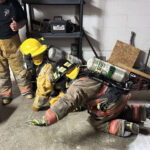CARIBOU, Maine — Last Christmas Eve, while Santa was busy flying about delivering toys to good girls and boys, there was a miracle of a different kind taking place in the skies — and one Caribou woman has much to be grateful for this holiday season thanks in large part to Crown Critical Care Transport (CCCT).
On Christmas Eve, 2012, Jeanine Watson was enjoying the holiday at her home with her husband, children, grandchildren and other family. It was common for the family to open presents on Christmas Eve and to celebrate her husband Paul’s birthday on Christmas Day.
Just after the family finished exchanging gifts, she began to experience a feeling of pressure and heaviness in her neck. Then the feeling started to spread lower into her arms and chest. Paul recognized the symptoms as a potential heart attack, and in just six minutes, he had her at the emergency room at Cary Medical Center.
“I was very scared,” said Watson as she recalled that evening. “I didn’t really know what was happening.”
By the time she arrived, her pain had worsened. The emergency staff realized she was, in fact, having a massive heart attack. Doctors stabilized her and called CCCT to bring her to Eastern Maine Medical Center in Bangor.
Darrell “DJ” Spooner, supervisor of CCCT and a critical care nurse from Castle Hill, was the flight nurse on duty that Christmas Eve, along with Critical Care Paramedic Travis Ginn, formerly of Ashland. In a rural area, hours away from hospitals which have the specialized equipment and staff to treat certain serious medical events, CCCT provides a vital service.
“We transport critically ill and injured patients out of everywhere in Aroostook County to anywhere from Bangor to Boston, usually for a higher level of care,” said Spooner. “Any specialized, interventional, definitive treatments that may be lifesaving are usually two to four hours away from The County … Bangor being the closest.”
Spooner and the CCCT team flew Watson in one of the two fixed-wing planes reserved for such missions. The planes, one each in Presque Isle and Caribou, are contracted from Fresh Air out of Caribou. Owner Bill Belanger provides the staff to fly the planes. Spooner says they use planes rather than helicopters because helicopters have trouble operating in inclement weather.
Watson started feeling worse shortly after the team transporting her took off in the Caribou-based aircraft. At approximately 11 p.m. on Christmas Eve, she went into cardiac arrest and lost consciousness.
“We were six minutes out of Bangor when she went unconscious and was technically dead,” said Spooner. “We defibrillated her and gave her medications and got her conscious again.”
The crew called ahead to the hospital to have a team waiting when they arrived.
Watson has a difficult time remembering her flight. Mostly, she recalls the medical staff wrapping her in a flight blanket and putting her on a stretcher prior to placing her in the plane, but she also remembers that she was never alone.
“I remember seeing a nurse sitting beside me, asking me if I was OK. DJ [Spooner] was very attentive. I remember him asking how I was feeling, if I was comfortable, if there was anything I needed,” she said. Doctors at EMMC treated Watson for 100 percent blockages in her heart. They performed surgery in their cath lab.
“The next thing I remember was waking up in cardiac ICU, and my husband walked into the room,” said Watson. It’s difficult to say how things may have been different had transportation been unavailable or if a slower mode of transportation, such as an ambulance, had been the only option to take Watson to where cardiologists could assist her with the blockages that were stopping her heart from performing properly. But, in her opinion, the care she received made all the difference.
“If it wasn’t for Crown CCT, I would not be alive today. My heart stopped in the plane, and my nurse, DJ Spooner, defibrillated my heart and brought me back to life,” she said. “We live in a rural area and we have limited access to the technology that is available elsewhere. Crown Critical Care Transport helps people in emergency situations receive care that is not available to us in the time frame that it is needed.”
Spooner agrees. He says the service’s highly trained staff of registered nurses and National Registry paramedics “are on staff around the clock every day of the year to respond to hospitals in Aroostook County to stabilize and care for these critical patients and transport them to definitive care even if it is on Christmas Eve at 11 o’clock at night.”
“Without Crown CCT and the extensive training that we do, many people in The County would not have as good of outcomes as they do today. Bangor is two and a half hours from Presque Isle by ground, one hour and 20 minutes by air. Portland is four hours by ground and one hour and 45 minutes by air (bed to bed times). Crown CCT employees have regular scheduled trainings two days per month to maintain the high level of expertise that they have achieved,” said Spooner. As for Watson, recovery has been a long road, but she remains optimistic.
“My recovery has been one day at a time. I have good days and bad,” she said. “I returned to work in February 2013. TAMC Cardiac Rehab helped me tremendously. I still do not have the stamina I used to have, but I keep trying.”
This Christmas it might be hard to match the gift of life that Watson and her family received last year, but her husband will always be grateful for his wife’s health.
“Paul said it was the worst and best Christmas ever — worst because I had a heart attack and died, best because I was brought back to life and we could hold hands and be together on Christmas Day,” she said.







